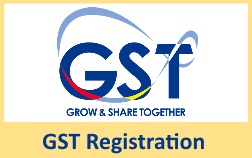Important Guide to Singapore GST Registration for New Services
Important Guide to Singapore GST Registration for New Services
Blog Article
The Ultimate Guide to Simplifying the GST Registration Process and Requirements for Small Company Owners

Understanding GST Fundamentals
To comprehend the principles of the Goods and Services Tax (GST) system, little organization owners must initially understand its underlying concepts and ramifications. Under the GST program, businesses are required to sign up and collect tax obligation on behalf of the federal government, ensuring transparency and compliance.
One of the key principles of GST is input tax obligation credit scores, which permits services to assert credit rating for taxes paid on their purchases. Comprehending these basic principles is crucial for small company proprietors to navigate the complexities of the GST system and make sure compliance with the legislation.
Qualification Criteria for Registration
Having developed a fundamental understanding of GST concepts, small company proprietors need to currently fulfill certain qualification criteria to proceed with the enrollment procedure. In India, entities engaged in the supply of goods or solutions with a yearly accumulation turn over exceeding Rs. 40 lakhs (Rs. 10 lakhs for special group states) are required to register for GST. In addition, specific organizations such as those entailed in inter-state supply of products, informal taxable persons, and those needed to pay tax under the reverse cost system should register for GST irrespective of their turn over. Moreover, companies that were registered under the previous tax obligation program (VAT, service tax obligation, etc) are additionally mandated to sign up under GST. Nonetheless, agricultural organizations that just provide produce out of main production are excluded from GST enrollment. It is important for entrepreneur to thoroughly analyze their eligibility based on these requirements to guarantee conformity with the regulation and prevent any kind of charges for non-compliance.
Records Required for GST Enrollment

Simplified Registration Refine Steps
Following the collection and confirmation of the requisite papers, the enrollment process for GST can be navigated through a series of streamlined actions designed to help with reliable conformity for small company proprietors. The very first step includes going to the GST portal and choosing the 'New Enrollment' option. browse around this web-site Ultimately, the candidate has to complete Component A of the GST REG-01 kind with information such as PAN, mobile number, and email address to acquire an OTP for verification. As soon as the OTP is obtained and gone into, a Short-lived Recommendation Number (TRN) is created for further process. The following step calls for submitting Component B of the kind with needed business details, submitting supporting documents, and finishing the verification process making use of DSC or EVC. Lastly, upon effective confirmation, an Read More Here Application Referral Number (ARN) is issued, indicating the conclusion of the GST enrollment procedure. By complying with these streamlined steps, local business owners can effectively register for GST and make sure conformity with tax guidelines.
Tips for Ensuring Compliance
To maintain regulative adherence and functional stability, thorough oversight and positive measures are pivotal in ensuring conformity with GST needs for local business proprietors. Small company owners need to stay upgraded with GST regulations, filing target dates, and any type of modifications in tax prices to prevent charges and keep a good standing with tax obligation authorities. One necessary suggestion for compliance is to maintain comprehensive and exact records of all purchases, consisting of invoices, billings, and costs connected to GST. Consistently resolving economic documents with GST returns can help in identifying and correcting any type of discrepancies without delay. Furthermore, carrying out periodic inner audits or looking for specialist support can make certain that business is complying with all GST rules properly. It is also crucial for local business owners to buy GST-compliant bookkeeping software application that can improve the tax obligation declaring process and reduce mistakes. Last but not least, participating in GST recognition workshops or training programs can improve understanding and compliance with GST guidelines, eventually profiting business over time.
Verdict
To conclude, tiny company owners have to comprehend the fundamentals of GST, meet the eligibility criteria, gather necessary records, and follow the simplified enrollment process actions to make sure compliance. By streamlining the GST enrollment process and needs, local business proprietors can stay clear of penalties and run their businesses efficiently within the lawful framework - Singapore GST Registration. It is important for small company owners to remain informed and certified with GST regulations to preserve an effective company procedure
Tiny organization owners looking for GST registration must ensure they collect and send the required documents to finish the enrollment process efficiently. The papers required for GST registration blog here generally consist of evidence of organization registration or consolidation, FRYING PAN (Permanent Account Number) card of the business address, entity and identity proof of the promoters/partners/directors, photos, address proof of the area of company, bank account declarations or terminated cheques, and permission types. Participating in GST awareness workshops or training programs can boost understanding and conformity with GST policies, eventually profiting the company in the lengthy run.
By streamlining the GST enrollment procedure and needs, tiny business proprietors can prevent fines and operate their businesses efficiently within the lawful structure. It is essential for small organization owners to remain informed and certified with GST guidelines to preserve an effective company procedure.
Report this page